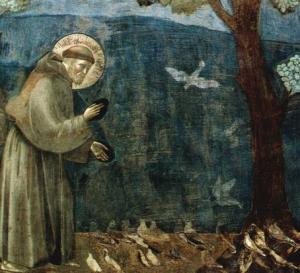 From the get go, we’ve built Christ’s Pieces around a conviction:
From the get go, we’ve built Christ’s Pieces around a conviction:
Christian practices matter.
As we’ve explored in Open Book, working through James Smith’s Desiring the Kingdom, it’s not enough to be informed and have all your beliefs in order. Plenty of people believe right in the cognitive sense, but their lives are functionally unredeemed. Instead, we need to train, to discipline, to form our bodies. Only then will we be transformed. Paul’s teaching in Colossians 3 about “putting off” the old and “putting on” the resurrected life may come to mind.
What, then, are Christian practices?
Toying with dozens of definitions, here’s how we’ve characterised it for Christ’s Pieces.
Christian practices are
… rich and repetitive actions we do,
over time and often together,
which engage our senses and imagination,
reminding us of God’s presence
and aiming us at His Kingdom
So, how might you get creative, and take an active role partnering with God’s animating Spirit toward Christ-like transformation?
Read on! Here’s our ever expanding bank of practices with which we’ve experimented at Christ’s Pieces …
Unbounded
 Reflection: Irenaeus, in the second century, wrote that “the glory of God is man fully alive”. The way of Christ isn’t safe or comfortable – it’s meant to be a life of risk. We demonstrate our faith by following wherever He may be leading and improvising in his grand story; despite possibly getting it wrong; despite it, at times, costing us dearly; despite our pride. THIS IS ‘THE
Reflection: Irenaeus, in the second century, wrote that “the glory of God is man fully alive”. The way of Christ isn’t safe or comfortable – it’s meant to be a life of risk. We demonstrate our faith by following wherever He may be leading and improvising in his grand story; despite possibly getting it wrong; despite it, at times, costing us dearly; despite our pride. THIS IS ‘THE
WAY’. Our fears and wrongly placed loves prevent us from living this way. They mute us; they hold us down; and they distort the presence of God in us. So, let’s put into practice this truth by training in casting aside our fears, daily.
Action: Bandage your non-dominant hand enough times to feel completely immobilised. Focus on the feeling of being unable to move your hand and pray: “Search me, God, and know me. Test me and know my anxious thoughts. See if there is any offensive way in meand lead me in the way everlasting.”
Now, begin to slowly unbind your hand as you continue to confess your fears to God and leave them with him.
Open and close your hand to feel the freedom of movement as you
continue to pray: “Lord, I know that in this life I will have trouble,
but I will take heart because you have overcome the world. Amen.”
https://christspieces.org/wp-content/uploads/2020/11/risk-practice-instruction-sheet.pdf
I Dare You to Move
 Reflection: The trinity is described using the Greek word perichoresis, which is often translated ‘to dance around’. The image is one of a dynamic God, interconnected, beautifully moving in and out and around. Because of this, when we lay down our lives we must become agile to join in the dance as God is repeatedly saying… “Behold, I do a new thing”. To move well without hurting ourselves we must prepare ourselves; we must
Reflection: The trinity is described using the Greek word perichoresis, which is often translated ‘to dance around’. The image is one of a dynamic God, interconnected, beautifully moving in and out and around. Because of this, when we lay down our lives we must become agile to join in the dance as God is repeatedly saying… “Behold, I do a new thing”. To move well without hurting ourselves we must prepare ourselves; we must
STRETCH!!!
Action: use a sports hat as your cue. While putting on your hat, pray aloud “God, Sanctify my imagination”
Stretch UP with both hands; look to the ceiling and take a moment to consider your Relationship with God. As you focus on the feeling of stretching, pray “Lord, I want to join you in a new thing in my
relationship with you”. Listen for a minute or two.
Repeat the process downward for your home life; to the right wall for your working life and left wall for your R & R. Journal any insights you have during this time.
https://christspieces.org/wp-content/uploads/2020/11/pioneering-practice-instruction-sheet.pdf
Open Alms
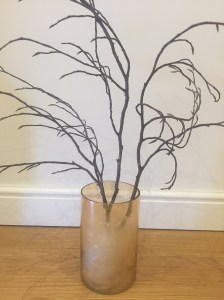 Reflection: Andrew Murray wrote the classic book “humility”, which was originally published in the late 1800s. It’s a little book about the simple profound truth that God, the creator of the universe, to lay bare, vulnerable, as a human baby. It’s about God’s humility in GIVING of himself.
Reflection: Andrew Murray wrote the classic book “humility”, which was originally published in the late 1800s. It’s a little book about the simple profound truth that God, the creator of the universe, to lay bare, vulnerable, as a human baby. It’s about God’s humility in GIVING of himself.
Of course, once we grasp that God is humble and generous, it follows naturally that WE have no right to cling, grasp or desire to possess. It is a total mindshift, that ALL OF LIFE IS GIFT and it is our job to keep the gifts flowing.
The bare, leafless winter tree is a picture of humility. The trees are stripped of their embellishment and the countryside is left looking poor, revealing all things previously hidden. It’s a picture of the incarnation – God, voluntarily unclothing himself of his grandeur and presenting himself poor,
vulnerable, and limited in time and space and body. And he says to us… Come, free people, this is THE WAY.
 Action: Find a leafless branch to keep in a pot or vase. Each day, take a moment to reflect on God’s humility and generosity by reading aloud Philippians 2:5-8. Lay on your back, on the floor (in the crucifix position) with your arms out and hands facing up.
Action: Find a leafless branch to keep in a pot or vase. Each day, take a moment to reflect on God’s humility and generosity by reading aloud Philippians 2:5-8. Lay on your back, on the floor (in the crucifix position) with your arms out and hands facing up.
Remain in your posture of openness lying face up with open hands,
Ask the Lord, what can I give today? Spend a few minutes and determine at least one act of generosity to do today.
Finish by praying aloud: “Lord, All of Life is Gift. What do I have that is not yours? Enable me to live with open hands and a joy filled heart. Amen”
https://christspieces.org/wp-content/uploads/2020/11/generosity-practice-instruction-sheet.pdf
‘Breaking the Fast’
Blessing practice instruction sheet 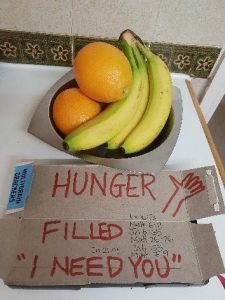 Reflection: God could have created living beings without stomachs or the need to eat/drink. How strange that He made animals and humans to need to source particular substances; prepare them and put them into a hole in our face!; that this ‘stuff’ would travel through our body; that a million chemical interactions would take place to take out what we need for energy and health and then our body would expel the waste. That there would be a built in feeling of when more or less was needed. Why?
Reflection: God could have created living beings without stomachs or the need to eat/drink. How strange that He made animals and humans to need to source particular substances; prepare them and put them into a hole in our face!; that this ‘stuff’ would travel through our body; that a million chemical interactions would take place to take out what we need for energy and health and then our body would expel the waste. That there would be a built in feeling of when more or less was needed. Why?
Preparation: Hunt around the house for a piece of cardboard food packaging. Write in big capital letters “HUNGRY” (and draw a hand) and below “FILLED” (and write 7 single verse references around bread/manna to meditate on – one for each day of the week before you meet again). Place this piece of cardboard with a bible in the place where you go when you first ‘break the fast’ in the morning – could be in the fridge with the milk or in the crockery cupboard – the weirder the better.
Action: Locate your bible and prompt sheet in your place of morning eating ritual. Prepare your food. Sit with your food /coffee before you, before you start to eat, place your hand on your stomach and focus on the feeling of HUNGER/desire/drive to eat. Tell the Lord the things you are hungry for (eg. energy, friends, patience, a solution to a problem) and then ask him for a hunger for himself and his word! Then, eat, drink!!! Focusing on the feeling of filling up while reading and re-reading the verse (meditate/’chew on’ the verse). Finish with a simple prayer outloud like “I NEED YOU, LORD” *** Don’t forget to place the bible and cardboard back ready for tomorrow.
Covid Bubbles and ‘Withness’
 Reflection: Covid has brought all kinds of fears and struggles to our doorsteps. The idea of a ‘social bubble’ has been used around the world to try to ensure safety and sanity for all. Whether it’s your friend in a neighbouring flat or your family within your home, we have drawn near to those who know us and whom we know. It has become important to know who is WITH us. I wonder if Covid bubbles can bring us new understanding of what Jesus was explaining in John 10:1-21 (and is echoed in Psalm 23).
Reflection: Covid has brought all kinds of fears and struggles to our doorsteps. The idea of a ‘social bubble’ has been used around the world to try to ensure safety and sanity for all. Whether it’s your friend in a neighbouring flat or your family within your home, we have drawn near to those who know us and whom we know. It has become important to know who is WITH us. I wonder if Covid bubbles can bring us new understanding of what Jesus was explaining in John 10:1-21 (and is echoed in Psalm 23).
Though none are promised freedom from difficulty, Jesus did say he protects us (v11, 12); leads us (v3,4); saves us (v9, 28); knows us (v 14); allows us to know him (v14); provides for us (v9); is present in danger with us (v11, 12); comforts us ( Ps 23:4) ; brings honour to us (Ps 23:5); and that his goal is to bring us life in its fullness (v10). He also says there are others who belong to him who he loves (v16). He reminds us that he will never leave us alone or forsake us (Heb 13:5).
The Advent song, O Come, O Come Emmanuel (Emmanuel meaning God WITH us) celebrates all that Jesus brings and the music embodies the mystery, beauty and sacred rest of God WITH us. Find a version that you enjoy — I like this one https://www.youtube.com/watch?v=KZggySBrroc
Practice: choose a bubble like object to place next to your bed as a reminder, preferably clear (snow globe; cloche; bauble; bubble wrap; upside down glass). As you go to bed in the evening, play quietly the song “O Come, O Come Emmanuel”. Feel free to choose your favourite version online, with lyrics or instrumental. As you climb into bed, wrap your duvet around you, focus on the feeling of your body ‘embraced’ and breathe deeply. Spend the duration of the song focusing on God as Emmanuel (God WITH us)… providing, protecting, facing danger, comforting, honouring and leading us (and others) to full life. He will NEVER leave us.
[If you have small children, you could explain the meaning of Emmanuel while tucking them in; play the song softly while praying God’s protection, provision, comfort etc over them.]
Practicing Resurrection
 Reflection: There is a very cool party trick where, if you hold two mirrors facing each other and look into one on just the right angle, you can turn a single reflection into a never-ending tunnel of mirrors reflecting each other back and forth. Kind of like a visual representation of eternity. Of course, we believe that the miracle of resurrection is no mere illusion. It is eternal life.
Reflection: There is a very cool party trick where, if you hold two mirrors facing each other and look into one on just the right angle, you can turn a single reflection into a never-ending tunnel of mirrors reflecting each other back and forth. Kind of like a visual representation of eternity. Of course, we believe that the miracle of resurrection is no mere illusion. It is eternal life.
In John 11 we watch Jesus raise his friend from the dead. We watch Jesus comfort his friends. And what does he say? *loose paraphrase alert*
Don’t Worry.
I am the resurrection and the life.
Believe in me and you will never die.
… And Martha confirms … I believe.
Practice: Set up two mirrors facing each other in a prominent place in your home. If they are small, they will need to be close together. If they are large you could put them on opposite walls for a very cool effect! Place a printed version of John 11:25-27 and The Apostles’ Creed nearby.
Each day, appreciate the eternal mirror phenomenon; read the verse and declare The Creed to your God (and remind yourself) aloud. Spend a moment considering the miracle of resurrection, that the gift of God is eternal life to you, starting right now.
Seeing more Deeply
 We represent Christ, we understand that, but actually, all things reflect Christ. Some animals and insects have ‘super’ visual abilities – like them, we desire to develop our ability to SEE more fully, the world around us.
We represent Christ, we understand that, but actually, all things reflect Christ. Some animals and insects have ‘super’ visual abilities – like them, we desire to develop our ability to SEE more fully, the world around us.
Action: leave a fish eye lens attachment with your phone. Each day, when you remove your phone from its charger, touch your closed eyes and ask God to bless them that they might see in a new way “Lord, open my eyes to see the wonders of your glory”
While out and about look for just one thing each day to reflect upon.
Ask God: What is the true ‘nature’ of this thing? What is its ‘destiny’? Then express your wonder and gratitude to God.
Reclaiming Love Songs
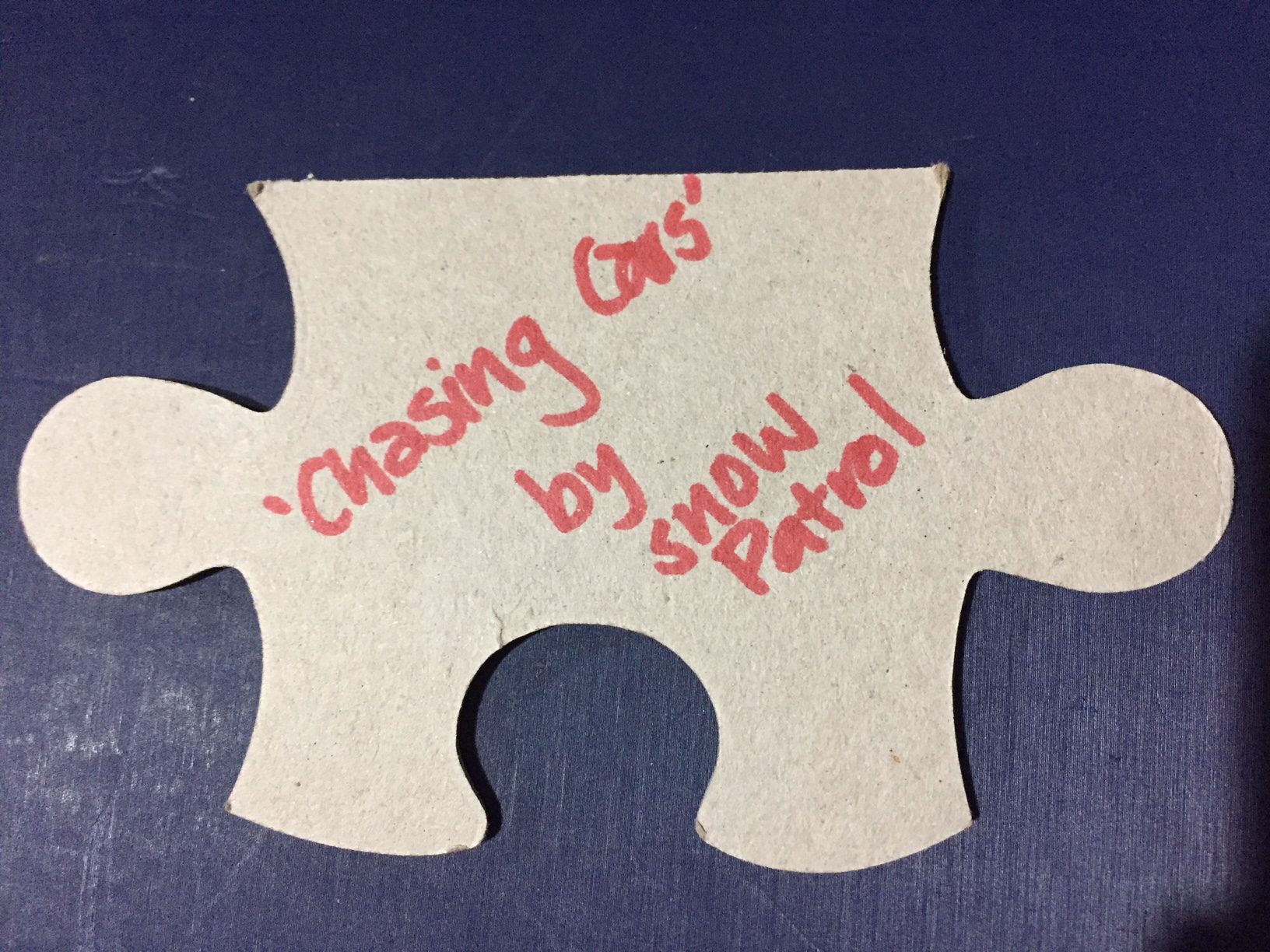 Reflection: What is your all time favourite love song? why? Our answers tell us something about our deepest desires.
Reflection: What is your all time favourite love song? why? Our answers tell us something about our deepest desires.
Action: write your favourite love song on the back of a puzzle piece and place it in a strategic place such as in your vehicle [the puzzle piece is a visual reminder of how God will perfectly ‘fit’ the hole in our hearts]. Listen to your song once per day; identify the specific yearnings being expressed and imagine how God might meet these yearnings in the future.
Relationships as Growth
 Reflection: Happiness is a bad master. If you aim at it, it is elusive, a moving target (like a bird in flight). Sanctification is the slow, sustained work of the gospel. Ironically, if we invest in this difficult, counter-intuitive journey of growth, deep, sustained happiness follows (like the bird roosting in the branches of a tree).
Reflection: Happiness is a bad master. If you aim at it, it is elusive, a moving target (like a bird in flight). Sanctification is the slow, sustained work of the gospel. Ironically, if we invest in this difficult, counter-intuitive journey of growth, deep, sustained happiness follows (like the bird roosting in the branches of a tree).
Action: Each morning as you face the day, consider one person who you will come in contact with that day. Ask: How can I contribute to their flourishing? and how does this relationship create an opportunity for me to grow? (consider the 9 fruit of the spirit for help if needed). Prompt: place a cross section of timber with visible rings with your morning coffee.
Prayer – Lord, please give me the patience and self-control to always lean toward persisting in relationships in favour of fleeing*; for a grace and humility to not control others and the perspective to know that the purpose for their existence is not my happiness. Please grant me a desire for others to flourish and for me to grow. [*exceptions such as abuse are acknowledged]
Sacred skin
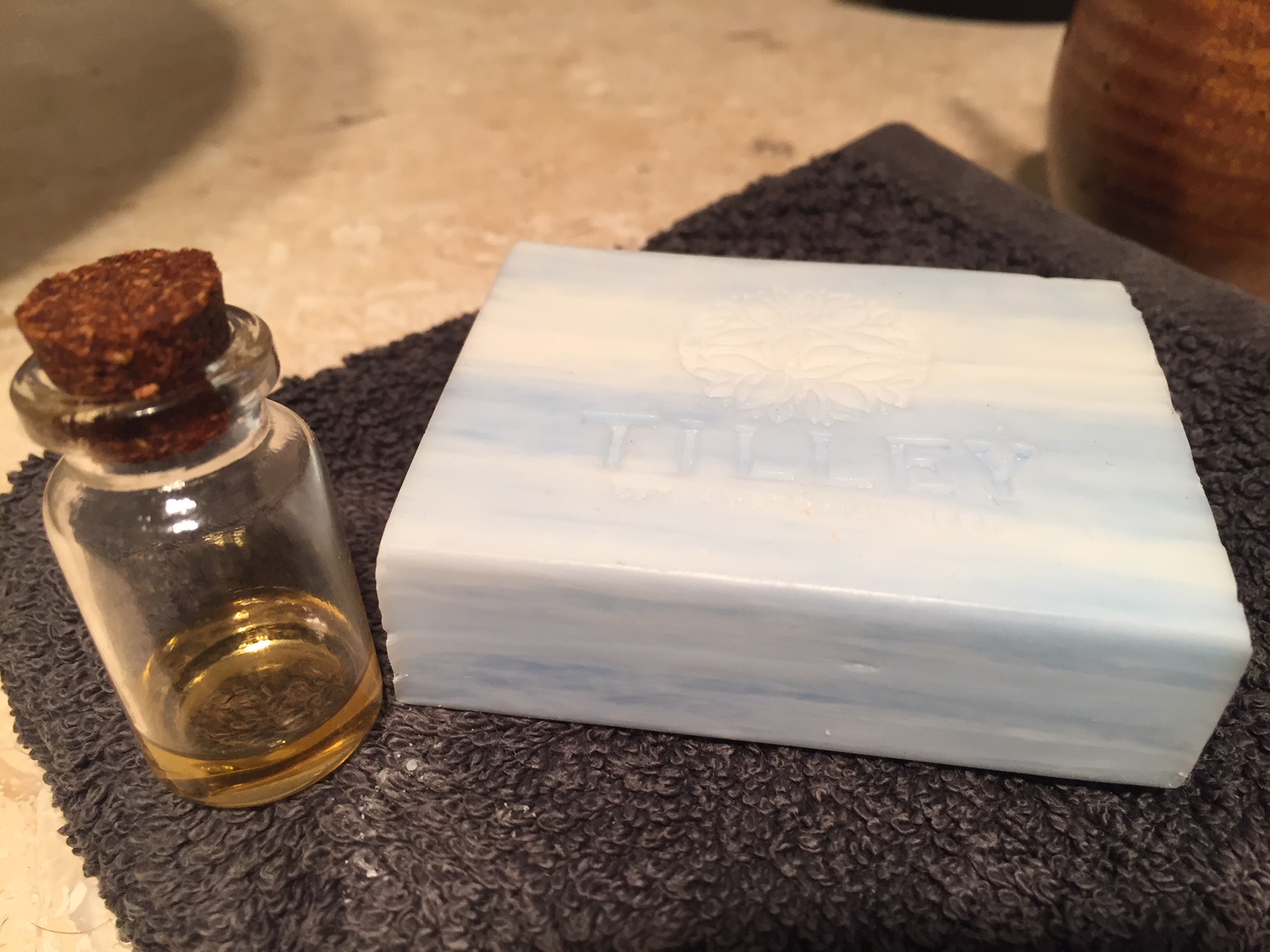 Reflection: Our bodies are a temple of the Holy Spirit (Read 1 Cor 6:9-19) . Honouring our bodies acknowledges the sacred in what could otherwise be considered mundane, messy or unimportant. This is a helpful reminder in cultivating holiness as it relates to our physical selves.
Reflection: Our bodies are a temple of the Holy Spirit (Read 1 Cor 6:9-19) . Honouring our bodies acknowledges the sacred in what could otherwise be considered mundane, messy or unimportant. This is a helpful reminder in cultivating holiness as it relates to our physical selves.
Action: Take special care whilst showering daily to wash your feet with a fragrant soap, dry them carefully and anoint them with oil using the sign of the cross. Quote 1 Cor 6:19 to yourself.
Braveheart and brotherhood: Honour in struggle
 Reflection: many people groups throughout history have established cultures of honour during times of great struggle. The tartan is a symbol of kinship in this way.
Reflection: many people groups throughout history have established cultures of honour during times of great struggle. The tartan is a symbol of kinship in this way.
Action: As you uphold others in prayer, use the terms ‘father’/’mother’/’sister’/’brother’ to reinforce the importance of belonging to your community; and to remind yourself of the honour that we each carry as part of the body of Christ. [prompt: place a piece of tartan in your place of prayer]
Calling on the Lord

Reflection – calling on the name of the Lord is a practice described many times in scripture. People call on the Lord in thanksgiving, joy, desperation, anger, surprise, amusement and many more emotional responses.
Action – place a strip of gold tape in locations that you will see frequently. The gold is a reminder of God’s heavenly presence on earth and a prompt to remind you to call on his name; reminding yourself of his presence and submitting to his rule.
Reconciliation

Reflection – this is a thorny and difficult topic so, start small! We move away from those we find difficult, rude or even just mildly annoying! We need to practice moving toward/leaning in rather than giving in to repulsion because that is what the kingdom looks like.
Action – daily reflection using two magnets. Turn your magnets to repel from each other (North vs North). Ask God to reveal personal and even institutional conflicts in your life/work scenarios. Turn your magnets to attract (North – South) and ask the Lord for opportunities to practice moving toward the difficult thing with a view of contributing to all things flourishing. Carry your magnet with you as a reminder.
Relational Giving
 Reflection – in many of our lives, our giving has become detached/impersonal. It is important that our giving meets another’s need but its also important that our giving transforms us.
Reflection – in many of our lives, our giving has become detached/impersonal. It is important that our giving meets another’s need but its also important that our giving transforms us.
Action – Take your tithe out in cash this month/week. Ask God for an opportunity to meet a need or bless another of his choosing. Carry the cash on you and listen.
Play
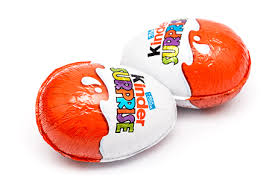 Reflection – Think of the games you played as children. What is it about kids that Jesus loves so much. G.K Chesterton notes that children, like God, are “fierce and free” (but) “we have sinned and grown old, and our Father is younger than we”. Play is important – it helps us not to take ourselves to seriously or think ourselves too important. It orders our priorities and renews our mind and body.
Reflection – Think of the games you played as children. What is it about kids that Jesus loves so much. G.K Chesterton notes that children, like God, are “fierce and free” (but) “we have sinned and grown old, and our Father is younger than we”. Play is important – it helps us not to take ourselves to seriously or think ourselves too important. It orders our priorities and renews our mind and body.
Action – attempt one play interaction a day. Buy a kinder surprise; build your toy and display it as a reminder
Barefoot Saints
 Reflection – “A prayer for our earth” at the conclusion of St Francis’ encyclical on the environment (Laudato Si), http://w2.vatican.va/content/francesco/en/encyclicals/documents/papa-francesco_20150524_enciclica-laudato-si.html
Reflection – “A prayer for our earth” at the conclusion of St Francis’ encyclical on the environment (Laudato Si), http://w2.vatican.va/content/francesco/en/encyclicals/documents/papa-francesco_20150524_enciclica-laudato-si.html
Action – Stand barefoot outdoors for the daily prayer “Adam from Adamah, human from humus; Lord, we are part of the earth, and it is part of us; Lord, help me tread lightly on the earth”
“What if Grandma were watching”: lessons from the great depression
 Reflections: Share grandparents stories of austerity measures from war times or the great depression – making dresses from flour sacks, saving every resource as precious and the centrality of the family plot to cultivate food.
Reflections: Share grandparents stories of austerity measures from war times or the great depression – making dresses from flour sacks, saving every resource as precious and the centrality of the family plot to cultivate food.
Action: This week focus on ‘reduce, reuse, recycle’ as you keep in mind the question: How would I act differently in my use of resources if my Grandparents were watching?
Low-tech lunch
 Reflection – All created things find their true and ultimate meaning in Christ. Watch “Wonder rush – As Kingfishers catch fire” Evan Koon’s expounding of Gerard Manley Hopkins’ famous poem youtube.com/watch?v=FlPOHGvhekQ
Reflection – All created things find their true and ultimate meaning in Christ. Watch “Wonder rush – As Kingfishers catch fire” Evan Koon’s expounding of Gerard Manley Hopkins’ famous poem youtube.com/watch?v=FlPOHGvhekQ
Action – fast from technology during your lunch break. If possible find a green space to listen to the birds and read aloud to yourself Gerard Manley Hopkins poem “As Kingfishers Catch Fire”
Greeting water
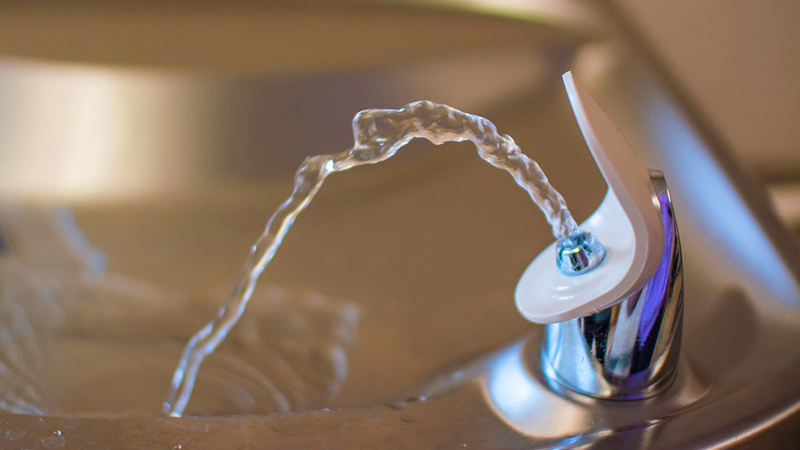 Reflection: Water was one of the first things God created. It is essential for life. We thirst for it, in order to continue our existence. Equitable access to clean drinking water is an important issue in need of just outcomes in our world. Many countries face water shortage for growing populations and some predict that, in times to come, wars will be fought over access to water. As Christians, water reminds us of our hourly dependence on God; Jesus referred to the Spirit as ‘living water’ given to those who believe or ‘thirst’ for God (John 7:37-39); He also explained that this ‘living water’… “becomes a perpetual spring within them (us), giving them (us) eternal life” (John 4:14)
Reflection: Water was one of the first things God created. It is essential for life. We thirst for it, in order to continue our existence. Equitable access to clean drinking water is an important issue in need of just outcomes in our world. Many countries face water shortage for growing populations and some predict that, in times to come, wars will be fought over access to water. As Christians, water reminds us of our hourly dependence on God; Jesus referred to the Spirit as ‘living water’ given to those who believe or ‘thirst’ for God (John 7:37-39); He also explained that this ‘living water’… “becomes a perpetual spring within them (us), giving them (us) eternal life” (John 4:14)
Action: Wherever you find water this week (in a puddle, river, ocean or from your bathroom faucet), greet it as St Francis would have “hello water, you’re very good!” and consider it as Jesus did: it’s meaning for life now and how it reflects a greater eternal truth.
Centering prayer Reflection: Our inner ‘whirings’ are a symptom of our brokeness (us turning in on ourselves). Centering prayer is a way of increasing our capacity for ‘contemplation’, or ‘listening to God’.
Reflection: Our inner ‘whirings’ are a symptom of our brokeness (us turning in on ourselves). Centering prayer is a way of increasing our capacity for ‘contemplation’, or ‘listening to God’.
Action: 1. Sit in an upright, attentive posture in a way that allows for an erect spine and open heart. Place hands in your lap. 2. Gently close your eyes and bring to mind a ‘sacred word’ or image to represent God (choose a name for God or a characteristic for God like, Love, Peace, etc) 3. Silently, with eyes closed, recall your sacred word/image to begin your prayer. As you notice your thoughts, gently return to your sacred word. Do this however many times you notice your thoughts wandering. 4. When your prayer period is over, transition slowly from your prayer practice to your active life.
Pilgrimage
 Reflection: The purpose of pilgrimage is to set apart a period of time to prayerfully devote one’s whole self to God. Through the act of rising early and walking for hours on end, one devotes body, mind and soul to God for purification. The act of walking provides a singular focus for pursuing God. So it can be made to and from anywhere. It is deliberate travel, for spiritual growth. It is a refuge from the noise of the outside world. It’s a journey, a time for prayer, quiet, travelling lightly, for surrendering to the unknown. It is the practice of embracing the here and now, today, this moment.
Reflection: The purpose of pilgrimage is to set apart a period of time to prayerfully devote one’s whole self to God. Through the act of rising early and walking for hours on end, one devotes body, mind and soul to God for purification. The act of walking provides a singular focus for pursuing God. So it can be made to and from anywhere. It is deliberate travel, for spiritual growth. It is a refuge from the noise of the outside world. It’s a journey, a time for prayer, quiet, travelling lightly, for surrendering to the unknown. It is the practice of embracing the here and now, today, this moment.
Action: plan a week long ‘pilgrimage’ in an area of historical significance or simply a dedicated Saturday on a trail in your local area. Be sure to turn off your phone, leave the world behind and pray as you go.
Fasting
 Reflection: Jesus said when you fast and pray – he expected that we would! In the process of ‘going without’ we teach our body and appetites patience and put God in first place to the flesh. We promote self control over anything that might control us.
Reflection: Jesus said when you fast and pray – he expected that we would! In the process of ‘going without’ we teach our body and appetites patience and put God in first place to the flesh. We promote self control over anything that might control us.
Action: ‘Go without’ a chosen pleasure for a defined period of time (a day, week or month). This could be routine eg. ‘ lunch on Wednesdays’ or occassional. Examples could include technology, food/fluids, entertainment, sleep, purchasing/money, work, social media.
Lectio Divina ‘Divine Reading’

Reflection: This prayerful method of engaging the scriptures has been practiced by Christians in homes and monastries for centuries.
Action: 1. Read (slowly, perhaps multiple times); 2. Meditate (what is this saying to me/what stands out); 3. Pray (talk to God about it); 4. Contemplation (sit with God, relax, ask him if he wants to reveal something to you); 5. Action (what should I do in response to this today)
Rule of Life
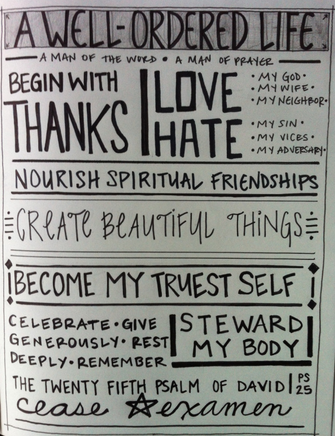
Reflection: If we want God to remain at the centre of our lives, we need sacred rhythms and rules to anchor us. We must intentionally commune with Him through the everyday rhythms of work, rest and play. A ‘Rule of life’ helps us be more focused and intentional in this pursuit. http://traverse.org.au/base/everyday-theology/ – module 3, pp 28-34
Action: set aside 2-3 hours to prayerfully write your ‘rule of life’. It should reflect your particular circumstances, heart and story.
White Feather
 Reflection: The white feather can symbolise cowardice (as in the case of British society during WWI) or courage/superior skill and strength (as in the case of the US military). We are a strange paradox of weakness and victory in Christ.
Reflection: The white feather can symbolise cowardice (as in the case of British society during WWI) or courage/superior skill and strength (as in the case of the US military). We are a strange paradox of weakness and victory in Christ.
Action: Carry the feather on you this fortnight; repeat 2 Cor 12:9 to yourself (… “My grace is sufficient for you, for my power is made perfect in weakness.” Therefore I will boast all the more gladly about my weaknesses, so that Christ’s power may rest on me); and watch/pray for opportunities to courageously act on Christ’s behalf for peace, reconciliation and flourishing.
Hope Remembered and Carried forward
 Action: Write down a song, a story and a scripture that have inspired your walk with God in the past. Each day spend 5 minutes reflecting on these ‘signs of hope’ given to you and conclude with the prayer “God, give me courage to live another day for you”
Action: Write down a song, a story and a scripture that have inspired your walk with God in the past. Each day spend 5 minutes reflecting on these ‘signs of hope’ given to you and conclude with the prayer “God, give me courage to live another day for you”
Reflection: See Maki Horanai’s “Song of the Harp” (https://theartstack.com/artist/maki-horanai/song-harp) as a symbolic image of moving forward amidst the swamp of life, carrying a song of hope and the source of life. Maki’s work can be purchased from her studio at Mt Tamborine (contact details can be found at http://makihoranai.com/). Also, some passages of hope… Josh 10:25, Ps 3:2-6, Ps 147:11, Mark 4:30-34, Jn 16:33, Rom 5:2-7, Rom 8:17, Col 1:15-20, 1 Cor 15:54-58, 2 Cor 4 & 1 Peter 1:3-6.
Tracing Silence
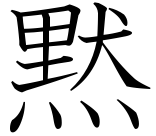 Action: Trace the Japanese symbol for Silence. Pray “God, speak to us in the silence”
Action: Trace the Japanese symbol for Silence. Pray “God, speak to us in the silence”
Reflection: Sometimes God is silent, at times, when we are most desperate for him to speak. Remember the persecuted Christians such as the Japanese in the 16th century. Pray that God would work something good in you through the times of silence in your own life.
Pumice stone
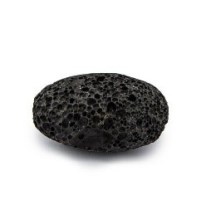 Action: During your daily bathing ritual, use a pumice stone to remove callouses from your feet. Ask God to bring to mind the name of someone who you are tempted to despise or protect yourself from. Plan to take steps toward them in love (listen to them, help them, pray for them, attend to them).
Action: During your daily bathing ritual, use a pumice stone to remove callouses from your feet. Ask God to bring to mind the name of someone who you are tempted to despise or protect yourself from. Plan to take steps toward them in love (listen to them, help them, pray for them, attend to them).
Reflection: we protect ourselves from the difficult, the needy, the awkward, the risky. A pumice stone removes callouses to make the feet sensitive once again. Use the stone to remind yourself daily to be vulnerable and sensitive to the most difficult, even though it may involve risk (word of caution: of course, there are many situations where vulnerability can be abused and we may need to seek counsel when we are unclear about this boundary).
Crushed flowers: prayer for the persecuted
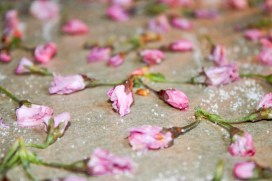
Action: Crush a flower in your hand and smell the aroma released. Begin and end your prayer time with “Our pain is not wasted; our hope is in Christ”. Use a guide such as Voice of the Martyr’s global report at https://vom.com.au/countries/
Reflection: “this path is narrow; its difficult to walk here”(p80, Silence, Shusaku Endo). Just as the two men sang “we’re on our way to Paradise” as they endured the pounding of the waves during Japanese water torture, there is no one answer to suffering, trauma and betrayals. We have to be comfortable with ambiguity and see through the pain.
The Golden Rule and ‘Reverse Evangelism’
 Action: Ask someone, who is not a Christian, about their beliefs. Listen attentively with love and respect, not as an opportunity to evangelise. Ask how they perceive Christianity. Listen, empathise, don’t defend. Thank them for their honesty. (‘Reverse Evangelism’ , The Evangelism Project, Peter Rollins, https://www.youtube.com/watch?v=XDd4G22zrOI )
Action: Ask someone, who is not a Christian, about their beliefs. Listen attentively with love and respect, not as an opportunity to evangelise. Ask how they perceive Christianity. Listen, empathise, don’t defend. Thank them for their honesty. (‘Reverse Evangelism’ , The Evangelism Project, Peter Rollins, https://www.youtube.com/watch?v=XDd4G22zrOI )
Reflection (Using the gold leaf to remind you of God’s glory in all of humanity – valuable yet fragile): It is important to anthropologise ourselves as a starting point for loving and respectful relationships. Take some time this week to consider your own ‘tribal’ boundaries eg. family, nationality, your church family, the ethos of the place you grew up in or the school you attended. How do these “loyalties” play into your perception and judgments about others? Imagine your attitude as a physical ‘posture’ toward the world and the many and varied people who you meet on a daily basis. Picture the position of your head, body and limbs. Be honest. In light of how your neighbour has experienced Christianity, imagine how you might change your posture toward ‘the other’. Sketch it.
Daily Needs Prayer Tool:
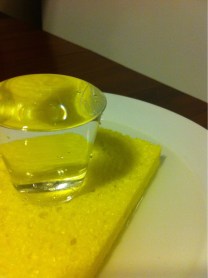 Action: in prayer, pour water into a cup until it overflows onto a dry sponge.
Action: in prayer, pour water into a cup until it overflows onto a dry sponge.
Reflection: We are called to overflow all that we receive from God. What do you plead God for in the mornings? Patience? Wisdom? Solutions to problems? The whole world is thirsty for these things. As you fill the cup, pray for your needs but don’t stop at yourself; continue to pour as the cup overflows, pray for those same things for colleagues, family and friends who can all be blessed to be a force for good in the world today!
https://christspieces.org/wp-content/uploads/2020/11/blessing-practice-instruction-sheet.pdf
Pottery reflection:
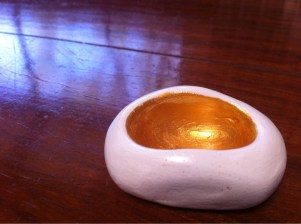 Action: Form a clay vessel with air-dry clay
Action: Form a clay vessel with air-dry clay
Reflection: as you mould and pinch and smooth, consider how God has formed you and will continue to form you.
Optional: Paint the inside metallic, representing God’s kingdom. You could even use the pot as your cup in the cup and sponge prayer practice.
Seedling Prayer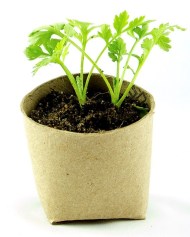 Action: Plant a seedling; daily pray the Lord’s Prayer with your seedling. Finish with “Lord, help us to cultivate a love for your kingdom’s coming”
Action: Plant a seedling; daily pray the Lord’s Prayer with your seedling. Finish with “Lord, help us to cultivate a love for your kingdom’s coming”
Reflection: Consider how God cultivates/grows the earth and how you might participate with him in this. Place your seedling in a prominent place as a reminder of your mission in the world – to serve his vision for all things.
Relinquishing Prayer

 Action: release helium balloon (or reflect on similar image) as a prayer tool.
Action: release helium balloon (or reflect on similar image) as a prayer tool.
Reflection: What would the Lord have me relinquish in my work today? eg. power, resources, time, worries or frustations.
Children’s Bible stories
 Action: Daily reflection using children’s bible eg. the Jesus Storybook Bible
Action: Daily reflection using children’s bible eg. the Jesus Storybook Bible
Reflection: A good children’s bible is a wonderfully simple paraphrase of the truths that may have become too complex and heavily laden in our minds.
Night sky listening
 Action: Spend 5 minutes nightly, prayerfully admiring the night sky
Action: Spend 5 minutes nightly, prayerfully admiring the night sky
Reflection: In an attitude of humility and readiness to listen, ask God “what should I be seeing and hearing around me at the moment (ie. in my current workplace/context)?”
Plaiting
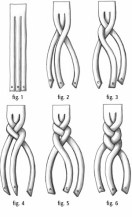 Activity: plaiting hair or cotton
Activity: plaiting hair or cotton
Reflection: pray for unity and strength in your family and in your relationship with God. “A person standing alone can be attacked and defeated, but two can stand back-to-back and conquer. Three are even better, for a triple-braided cord is not easily broken” (Ecc 4:12)
Aromas
 Activity: anoint yourself with oil during your morning time spent with God
Activity: anoint yourself with oil during your morning time spent with God
Reflection: Just as the Jewish people leave spice on the tips of their tongues at the conclusion of the Sabbath to allow the ‘aroma’ of this special time to linger, anointing oil can help remind you of God’s presence as you continue throughout your day.
https://christspieces.org/wp-content/uploads/2020/11/faith-instruction-sheet.pdf
Hessian
 Activity: place a square of hessian in your wallet to remind you of the principle of simplicity in your consuming
Activity: place a square of hessian in your wallet to remind you of the principle of simplicity in your consuming
Reflection: Consider your purchases carefully as you remember the inspirational life of Saint Francis of Assisi (and many other giants of the faith who have chosen lifestyles of simplicity in order to more faithfully follow Christ). Remember our responsibilty in caring for the cosmos and our fellow human beings.
Baking Bread
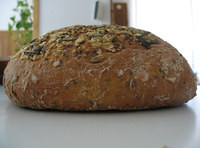 Activity: Bake bread at home
Activity: Bake bread at home
Reflection: consider our food, the earth and the work that goes into cultivating and processing the food that we eat. Contemplate the role that God has given us in ‘arranging’ the natural world. Consider how food is a daily reminder of our dependence and the truth that no matter how capable or well resourced we are, we are not self sufficient.
Sign of the Cross
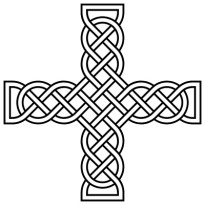 Activity: Mark yourself with the sign of the cross before crossing the threshold of your home to enter your day.
Activity: Mark yourself with the sign of the cross before crossing the threshold of your home to enter your day.
Reflection: A very old practice used to demonstrate and remind yourself that you belong to Christ; bought at a price. Bonhoffer used the sign of the cross throughout his time in prison. Though there are several variations, one example is to use the thumb to mark a small cross on the forehead, lips, heart and shoulders. You may wish to add a prayer such as: “Lord, I am yours, be glorified in what I think, in what I see, in what I say, in what I desire, in what I do, and in where I go today”.
Gratitude Journal
 Activity: record 5 things you are grateful for at bedtime nightly or do verbally with family over dinner. Prompts to get you started: opportunities, nature, food and drink, places, our bodies, dreams and hopes, memories, art, animals, people, happy and challenging experiences.
Activity: record 5 things you are grateful for at bedtime nightly or do verbally with family over dinner. Prompts to get you started: opportunities, nature, food and drink, places, our bodies, dreams and hopes, memories, art, animals, people, happy and challenging experiences.
Reflection: Studies show increased happiness, sleep, decreased depression and anxiety and improved blood pressure are associated with performing this task regularly and scripture instructs us to give thanks (1 Thess 5:18, Ps 92:1-2).
Placing a Stone in Water
 Action: place a stone in water and position somewhere visible throughout the day.
Action: place a stone in water and position somewhere visible throughout the day.
Reflection: borrowed from monastic traditions, this practice is a symbolic reminder of our commitment to Christ through baptism and daily commitment to live for Him. It also reminds us of Rev 2:17 which makes reference to God giving us a new name, written on a stone.
Jelly making
 Action: make red jelly (in heart shape mould for added effect!)
Action: make red jelly (in heart shape mould for added effect!)
Reflection: Pray Ezekiel 36:26 for yourself, that you will remain open, vulnerability and sensitive to those who are hurting. That you will become more like Christ in sacrificial love for others.
Ez 36:26 “Moreover, I will give you a new heart and put a new spirit within you; and I will remove the heart of stone from your flesh and give you a heart of flesh”
Pop art
 Action: apply ‘pop art’ effect to a photo of yourself. Display or use as bookmark
Action: apply ‘pop art’ effect to a photo of yourself. Display or use as bookmark
Reflection: there is light and shade in all of us. Ask yourself: what are my blocks, jealousies, prejudices, hatreds and ways of comparing myself with others? Consider Jesus own teaching about forgiveness (Matt 18:21-35).
Earplug activity
 Action: use earplugs during your designated prayer time.
Action: use earplugs during your designated prayer time.
Reflection: with earplugs in, pray for your needs and those of your known friends and family. Then, remove the earplugs and ask God to help you hear ‘the voices from the margins’ before praying for those with whom you have no immediate contact or natural compassion for. Finish by reading ‘the beattitudes’.
Silent Meal
 Action: silent thanksgiving while eating the evening meal or breakfast
Action: silent thanksgiving while eating the evening meal or breakfast
Reflection: consider the ‘sources of nourishment’ in your life eg. relationships, beauty, nature, music, rest, interests.
Hand Spelling
 Action: with your index finger in the palm of your opposite hand trace the letters to spell out a message of gratitude such as “Life is Gift”
Action: with your index finger in the palm of your opposite hand trace the letters to spell out a message of gratitude such as “Life is Gift”
Reflection: Ann Sullivan, Helen Keller’s teacher, used this technique to ‘unlock’ communication for her student. Anne’s service was a gift of enormous proportions to Helen. Consider how God has nourished and enabled you through others and give thanks.
Hugs

Action: whenever giving a hug as a greeting, remember God’s ‘open arms’ posture to you.
Reflection: Consider the components of a hug and how they parallel having an open heart.
Washing & Drying the Dishes

Action: sing the hallelujah chorus while washing the dishes (you may want to post the words nearby)
Reflection: give thanks for the everyday ordinariness of serving Christ in the mundane. “when you did it for the least of these, you did it for me” Matt 25:40
Drawing the anchor
![]()
Action: practice drawing the anchor icon daily as an act of meditation during a break or quiet time.
Reflection: consider the early Christians and the persecution they faced from the Roman empire. Consider how our faith is the same, whilst faced with the ‘empire’ of Global Consumerism.
Reef Reflection
 Action: Hold and reflect upon your piece of bleached coral as you confess the ways that you have bought into the cares of the world, removing the power of the cross from your life. Contrast the image of the thriving reef and remind yourself of Jesus’ path to true flourishing – justice and sacrificial faithfulness. Over the course of one week, read Matthew 5, 6 and 7 for a reminder of
Action: Hold and reflect upon your piece of bleached coral as you confess the ways that you have bought into the cares of the world, removing the power of the cross from your life. Contrast the image of the thriving reef and remind yourself of Jesus’ path to true flourishing – justice and sacrificial faithfulness. Over the course of one week, read Matthew 5, 6 and 7 for a reminder of 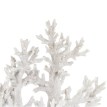 how Jesus instructed us to live.
how Jesus instructed us to live.
Reflection: Consider how God’s idea of fruitfulness, thriving, shalom is like a reef. Rising sea temperatures and pollution bleach and kill the coral. How has our culture’s image of ‘the good life’ similarly ‘bleached’ the vibrancy of our faith.
Lives well lived
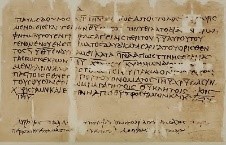
Action: Daily reading of portion of ‘letter to Diognetus (Nn. 5-6; Funk, 397-401)
Reflection: “only the non-ideological, embracing, forgiving and shalom-filled life of a dynamic Christian community formed by the story of Jesus will prove the gospel to be true and render the idolatrous alternatives fundamentally implausible” Colossians Remixed p114
Preaching to Creation

Action: Sing with, pray with or preach to a living thing around your home or on your way to work each day eg. a pet, tree, insect, bird.
Reflection:
“God wrote, “I love you” – he wrote it in the sky, and on the earth, and under the sea. He wrote his message everywhere! Because God created everything in his world to reflect him like a mirror – to show us what he is like, to help us know him, to make our hearts sing. The way a kitten chases her tail. The way red poppies grow wild. The way a dolphin swims.” (The Jesus Storybook Bible p12).
In Psalm 19 we read of the heavens singing and the mountains shouting.
In a friend’s dog, Lil, we see a faithful companion ever-present in painful times.
In Francis of Assisi we see precedence for preaching to creation in his famous sermon to the birds.
The gospel is good news to all of creation. In declaring (singing, praying/lament or preaching) the story of God to creation, we remind ourselves of the story in all of its detail and grandeur!
Turning to face the Sun/Son
 Action: Whenever advertising catches your attention, look to the heavens and remind yourself “Enough”. Keep a sunflower in a prominent place to remind you of your practice.
Action: Whenever advertising catches your attention, look to the heavens and remind yourself “Enough”. Keep a sunflower in a prominent place to remind you of your practice.
Reflection: Just as a sunflower always turns to face the sun; we must constantly look to ‘the Son’ to remind ourselves that competing frames of reference, like consumerism, should have no power over us, the people of the cross. The narrative of Christ says “Enough”: “Enough” stuff; you are “Enough” in that you image Christ; and God is more than “Enough”. In Ephesians 5:5b “a greedy person is really an idolater who worships the things of this world.” Our contentment is a sign of the kingdom when we direct our addictions/our affections toward God and we are ‘FOUND IN HIM’
Inclusive Hospitality
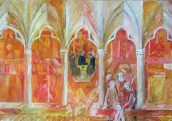 Action: Ask God for someone in your daily work to whom you should be actively listening; preferably someone without a voice. Listen. Include. Pray. OR next time you have friends for dinner, invite someone who is often excluded.
Action: Ask God for someone in your daily work to whom you should be actively listening; preferably someone without a voice. Listen. Include. Pray. OR next time you have friends for dinner, invite someone who is often excluded.
Reflection: ‘Table Benediction’ by Darryl Johnson, http://www.theworkofthepeople.com/table-benediction
Ethical Consumption
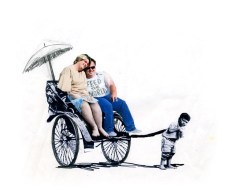 Action: Download an ‘ethical shopping’ app to help you make informed decisions about the impact of your purchases on the environment and people living in relative poverty OR simply avoid products from high risk processing zones (China, Philippines, Bangladesh, Indonesia, Sri Lanka)
Action: Download an ‘ethical shopping’ app to help you make informed decisions about the impact of your purchases on the environment and people living in relative poverty OR simply avoid products from high risk processing zones (China, Philippines, Bangladesh, Indonesia, Sri Lanka)
Reflection: “Who pays the price? the human cost of electronics” http://www.youtube.com/watch?v=ns-kJ5Podjw
Advent Candles
 Action: lighting of the advent candles and reflections leading into Christmas with 5 minutes of silence and stillness.
Action: lighting of the advent candles and reflections leading into Christmas with 5 minutes of silence and stillness.
Reflection: An ethic of suffering. “Nature trembled and said with astonishment: What new mystery is this? The judge is judged and remains silent; the invisible one is seen and does not hide himself; the incomprehensible one is comprehended and does not resist; the unmeasurable one is measured and does not struggle; the one beyond suffering suffers and does not avenge himself; the immortal one dies and does not refuse death. What new mystery is this?” (Second-century bishop Melito of Sardis).